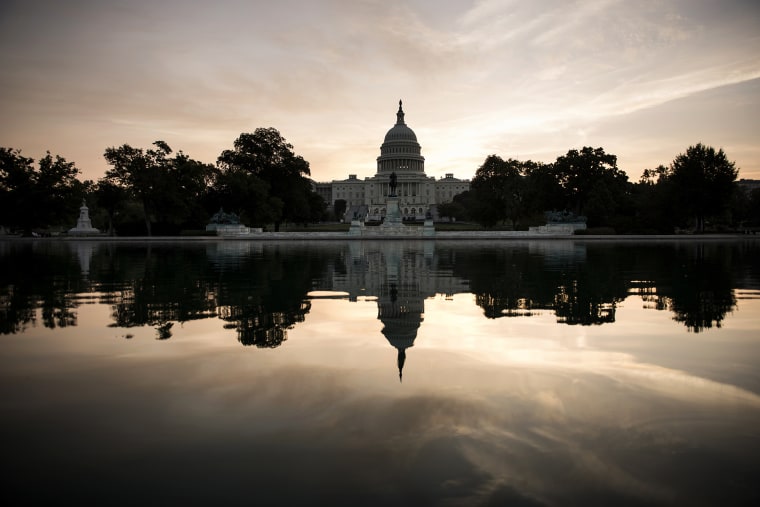Republicans hold a slight advantage over Democrats in the midterm elections that take place less than three weeks from now, according to a new national NBC News/Wall Street Journal poll.
RELATED: North Carolina Senate seat may be price of GOP success
But their edge over Democrats (two points among likely voters) is narrower than it was at this same point in 2010 (seven points), suggesting the GOP won’t see the wave-like gains it made in the last midterm cycle.
And the poll finds that the overall electorate is much more unstable than in the past – voters are less interested in the election, but also angrier with Washington – which could produce unpredictable results benefiting either party.
“There may be a political hurricane in November, but today you have to look at the forecast, and it looks like swirling winds,” says Democratic pollster Peter Hart, who conducted the poll with Republican Bill McInturff.
“I think it’s going to be a very good Republican year,” McInturff adds. “But plus-two [points] is very different than plus-seven.”
And he strikes this note of caution about how any outcome is far from certain: “When you are sitting on top of an unstable electorate, there is a joker in the deck.”
What’s helping Republicans
In the poll, 46% of likely voters prefer a Republican-controlled Congress, versus 44% who want Democrats in charge.
That two-point GOP lead is greater for Republicans than it was at this same point during the 2012 presidential election (when it was even at 45%), but it’s less than the seven-point advantage they enjoyed in 2010 (50% to 43%).
But among a wider swath of all registered voters, Democrats have a four-point edge over Republicans, 46% to 42%, suggesting that a stronger turnout could benefit their candidates.
Still, the overall midterm-election fundamentals appear to benefit Republicans. President Barack Obama’s approval rating stands at 42% among registered voters – up two points from his all-time low a month ago.
A whopping 65% of voters believe the country is headed in the wrong direction – the highest percentage the poll has ever measured before a midterm election.
Only 28% think the U.S. economy will improve over the next 12 month, while just 31% are currently satisfied with the economy.
And Republicans have more interest in the upcoming elections (59% say they’re very interested) than Democrats do (47%).
What’s helping Democrats
Although those fundamentals are aiding Republicans, there are numbers in the NBC/WSJ poll indicating Democrats could be in store for a better-than-expected Election Night.
For starters, 50% of voters hold an unfavorable view of the Republican Party, compared with 43% who say the same of Democrats.
“That’s not the track you want for your brand three weeks before the election,” says McInturff, the GOP pollster.
In addition, there’s evidence that the unpopular Obama might not be a substantial drag on Democratic candidates. A plurality of registered voters – 43% – say that their vote won’t signal anything about Obama or his standing. (By comparison, 32% say it will be a vote of opposition to Obama, and 24% say it will be a vote of support.)
Asked another way, 71% say their vote is deciding between two candidates who would better represent them in Congress, versus 24% who say their vote is to express their dissatisfaction with Congress and the nation’s direction.
And in perhaps the best news of all for Democrats in poll, they’re leading Republicans in congressional preference among registered voters in the top-11 Senate races, 47% to 42%.
That’s a reversal from a month ago, when Republicans held a 10-point lead in the top Senate races.
What’s making the elections so unpredictable
Yet here’s why the political environment looks so unstable: Many voters are tuning out the elections.
According to the poll, high interest in the midterms has dropped since June (from 51% to 50%) – when interest in previous election cycles has always increased.
The lack of interest is especially true among political independents, who typically have to be energized for a party to make wave-like gains in an election.
“2014 will likely set a record for the most amount of dollars expended per voter to reach and persuade the fewest amount of voters,” says Democratic pollster Fred Yang of Hart Research Associates.
What’s more, voters appear to be disgusted with both parties. Just 12% approve of Congress’ job – which is tied for its all-time low in the poll.
And only 30% of voters say their member of Congress deserves to be re-elected, while 57% say it’s time to give a new person a chance.
“There will be a winner on Election Night,” Yang adds, “but this poll suggests it is unlikely to be a satisfied American voter.”
The NBC/WSJ poll was conducted Oct. 8-12 of 1,000 registered voters – including 350 cell phone-only respondents and another 41 who were reached on a cell phone but who also have a landline – and it has a margin of error of plus-minus 3.1 percentage points.
The likely voter sample had 666 respondents, with a margin of error of plus-minus 3.8 percentage points.
